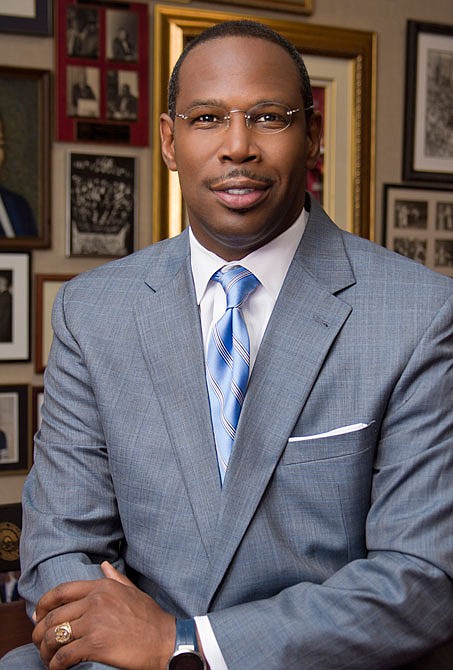Said Sewell, Lincoln University's former provost and Academic Affairs vice president, is one of three finalists for president of Kentucky State University, Frankfort.
The Kentucky school announced the three finalists last week, and said Kentucky State's Board of Regents "anticipates making the final selection in March 2017."
Sewell came to Jefferson City in August 2014 from Ohio's Kent State University, where he had been that school's dean of the College of Undergraduate Studies and, ultimately, assistant provost for Academic Affairs.
But, since August 2015, Sewell had been in a dispute with members of LU's faculty about his leadership as Lincoln's provost and VPAA, culminating in last September's 88-18 Faculty Senate vote of "no confidence" in Sewell's work.
About a month later, Sewell began an extended leave of absence, citing personal reasons.
LU President Kevin Rome told the News Tribune on Monday that Sewell, a political science professor, currently "is still teaching online courses."
The other two finalists for the Kentucky State position were identified as:
M. Christopher Brown, Ph.D., currently the executive vice president for Academic Affairs and provost at Southern University and A&M System, Baton Rouge, Louisiana.
Justice Tom Colbert, a Kentucky State graduate who holds a law degree from the University of Oklahoma, and who currently is the Oklahoma Supreme Court's chief justice. Colbert also is a former assistant dean at Marquette University's Law School.
A story in Monday's Herald-Leader, the Lexington, Kentucky, newspaper - 25 miles from Frankfort - began: "Some Kentucky State University faculty and alumni are pushing back after the school's board of regents announced Friday that their $120,000 search for a new president had produced two finalists with controversial backgrounds and one with less than two years experience in higher education."
A Frankfort state representative, who also is a Kentucky State alumnus, told the Lexington paper he had "a lot of questions about this process and the selection" after the search committee passed over the school's current, interim president, Aaron Thompson, who had "significant support from faculty, alumni and the Frankfort community after financial problems almost closed the school down."
Sewell is one of the two candidates with controversies, the Lexington newspaper reported, citing last September's no-confidence vote and his leave-of-absence.
In its story Saturday, the Frankfort State Journal newspaper also reported Sewell being "one of five defendants in a federal whistleblower lawsuit."
The News Tribune reported last summer that May 31, 2016, lawsuit accused Kent State and four of its officials - including Sewell - of violating federal whistleblower laws by not renewing Lisa D. Roberto's employment contract, in retaliation "for her role in exposing the submission of false claims for payment by the United States Department of Education."
On the advice of attorneys in Ohio, Sewell never has discussed that case, other than to say last summer that the Ohio attorney general's office "already (had) filed a motion to dismiss it against all named individuals."
Nancy Grim, the Kent, Ohio, attorney handling Roberto's suit, told the News Tribune on Monday she's still waiting for a judge's ruling on the defendants' "procedural motion."
Both Kentucky newspapers reported that Brown was the other controversial candidate.
The Frankfort State Journal reported Saturday: "Brown resigned as president at Alcorn State University in Lorman, Mississippi, in 2013 as the Mississippi College Board was moving to suspend him for bid-law violations, according to The Associated Press."
And the Lexington Herald-Leader also cited The AP in explaining Monday that Brown resigned "after reports of lavish upgrades to the president's residence without seeking the legally required bids."
Like Lincoln, Kentucky State University is a historically black college/university (HBCU) located in the state's capital city. Both became federal land grant schools in 1890, when Congress added HBCUs to the list of land grant schools - like the University of Missouri-Columbia - originally named in 1862.
Kentucky State is a little smaller than LU, with approximately 2,200 students and 135 full-time faculty members, compared with Lincoln's 2,738 students and more than 150 faculty.

